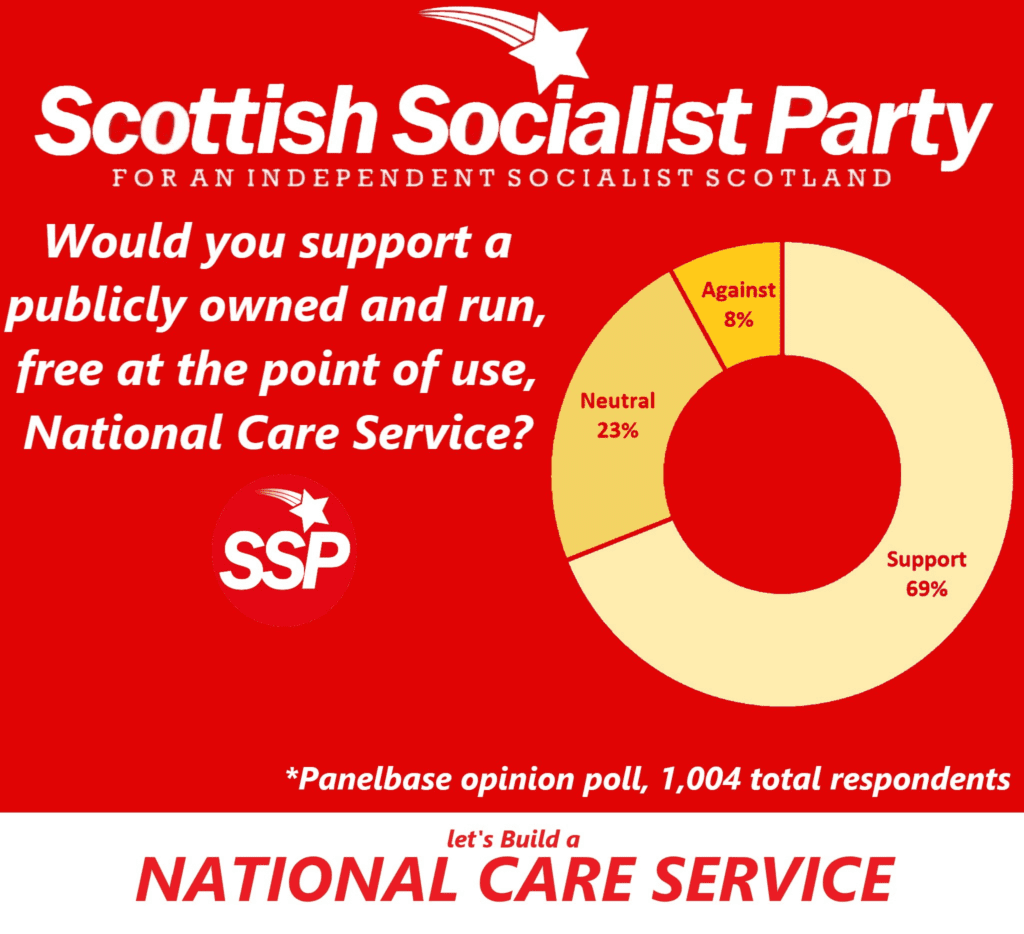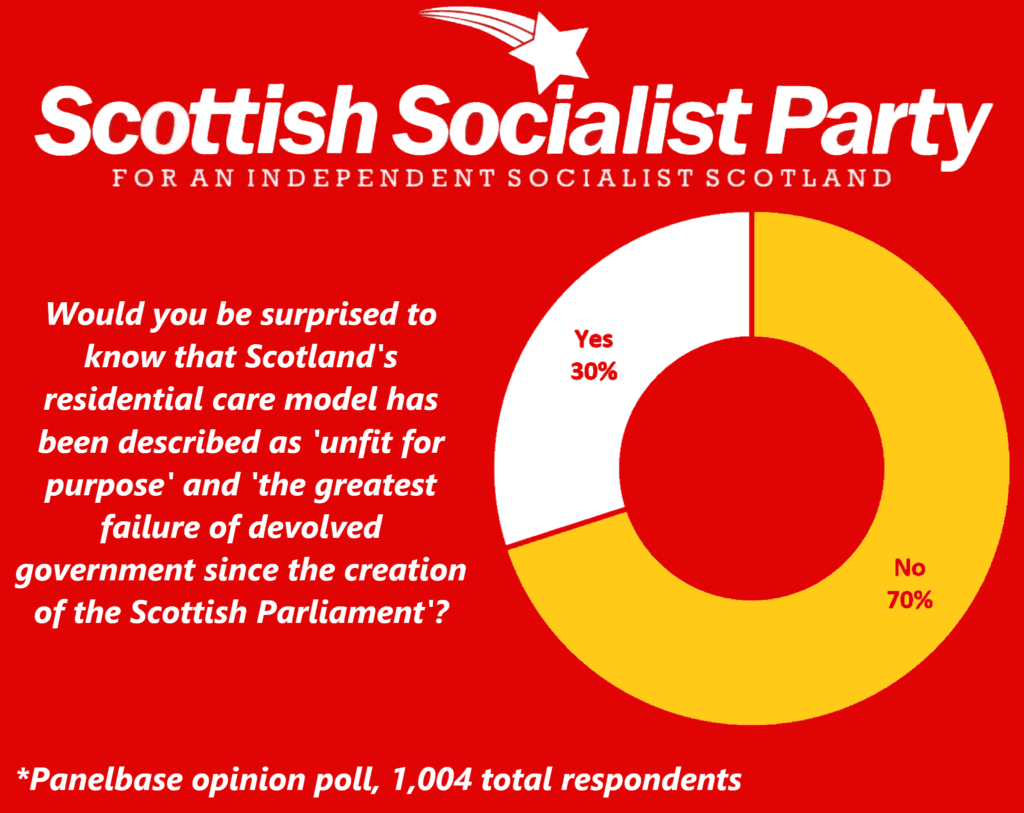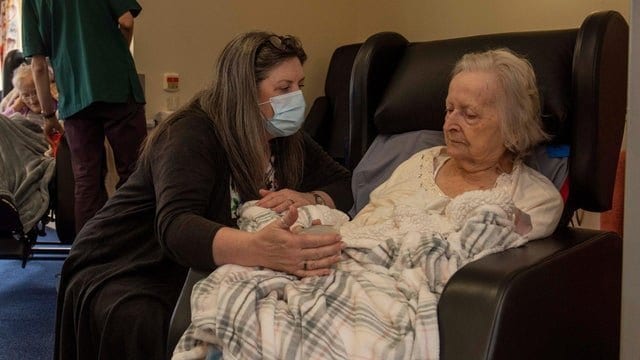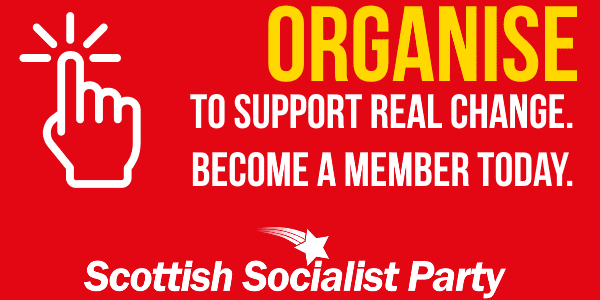Scottish Socialist Party National Co-spokesperson Colin Fox has called for a radical rebuild of Scotland’s care sector, to transform it into “the best in the world”.
“My ambition is to take care from something we are ashamed of and make it something that we are proud to have, as the best in the world,” Fox said.
In an online public discussion with care worker Trish McLaughlin and the SSP’s Calum Martin, Fox reiterated the party’s demand for a publicly-owned National Care Service which, like the NHS, is free at the point of need.
Trish issued care workers’ demand for greater dignity for themselves in their work, and dignity for service users in care.
In the latest of a series of public discussions on the need for a National Care Service – where previous participants include “Labours of Love” author Madeleine Bunting, SAGE advisory group member Prof. Allyson Pollock, and former NHS Scotland Chief Executive Derek Feeley – care worker Trish McLaughlin laid bare the stark realities facing care workers before and during the Coronavirus pandemic.
Trish said:
“I’ve spoken to carers that have been told things that are in direct contrast with what the government is telling them, and they have to choose who to listen to. At the end of the day, the government aren’t the ones that pay their wage, so they have to listen to the bosses.
“It has to change. A National Care Service would change that.
“MPs and other people say ‘go and work in social care’, and what they’re saying is, ‘we know they need people because people leave all the time, but rather than fix it we’re just going to throw people at it and some of them will stick’. But a third of them don’t.
“There’s no continuity, and there’s no continuity between providers. We talk about ‘best practice’ for our service users, but there doesn’t seem to be a ‘best practice’ for the staff, for their needs, and the only way to do that is to have a National Care Service.
“I’ve always had a problem with big companies that count their profit in the millions, but if their staff are promoted, their wage increase is counted in pence. The duties people have, the wages don’t reflect it.
“There are issues with social care that have been normalised. The last [former carer that Trish spoke to] went to work in a supermarket because she got paid more, and didn’t have to worry about sending people to hospital to die.
“They just don’t have the support. I know a lot of people that have left; there’s going to be a lot more. When the pandemic’s over, there will be a lot of carers that hold their hands up and say ‘I’m done’.
“I’m speaking to carers in Glasgow and Edinburgh saying, ‘we know what we’re being asked to do isn’t right. We don’t have the support. But what else can we do – if we leave they’re going to bring somebody in that’s not trained’.
“There’s less promotion of union membership now. There’s loads of carers in the private sector that don’t realise they can be in a union, and they should be. You can join a union; you are allowed to join a union. Now, more than ever, you really do have to.
“People say it takes a village to raise a child. It takes a community to take care of your elders.
“It can’t be privatised more. It’s owned by hundreds of different companies, and it’s not working. So you go the other way, so it’s owned by everyone, and everyone contributes through their taxes, so people aren’t having to sell their houses, so people aren’t having to go through their life savings.
“It’s not about money, and it’s not about soundbites, and it’s not about politicians – it’s about dignity of life. Dignity of life for service users, and the people providing it.”

Opinion polling conducted by Panelbase on behalf of the SSP revealed last week that an overwhelming 69% of people in Scotland support the creation of a publicly-owned National Care Service.
That figure rises to 72% among women, while 70% said they are NOT surprised to hear care home COVID-19 deaths described as the Scottish Parliament’s “greatest failure”.
The COVID-19 crisis has brutally exposed the dangerous flaws in Scotland’s privatised system of care.
Out of 100,000 Coronavirus-related deaths in the UK, around 30-40,000 have occurred through care homes. 40% of care homes examined by the care inspectorate in Scotland in 2020 were found to be “inadequate”.
UK government statistics revealed this week that carers are among the occupations most likely to die from Coronavirus.
Care workers have faced the Coronavirus crisis while dealing with the crisis of poverty pay and unsafe work. 43% of Scotland’s care workers receive less than £9.30 an hour – and the majority of low-paid care workers are women or migrants. One-third of care home staff resign each year over poor conditions – a loss of experience that undermines care quality. 52% of Scotland’s care homes report daily job vacancies.
In May 2020, the SNP and the Tories voted together to shut down collective bargaining for private care workers.
In 2019, the Centre for Health and the Public Interest revealed that at least £1.5bn “leaks” out of the care system through tax haven scams and into private hands every year. There are around 1200 private care providers in Scotland, and 77% of care is delivered by private firms.
Personal charges for residential care can climb to well over £1600 per week, or almost £90,000 per year.

Colin Fox said:
“It’s not just the failure of PPE, which they didn’t have. It’s not the fact that people were taken out of acute NHS and put into care homes that weren’t fit to look after them. It wasn’t just the waste management failures. It wasn’t just the deficiencies in the management systems. It wasn’t just the shortage of care staff, and the fact that a third of of the entire care staff in Britain leave the profession every year.
“COVID didn’t cause this crisis. It’s, unfortunately, the case that this is a care service that has been in crisis for an awfully long time.
“69% support for a National Care Service is really encouraging, but what made by heart sing is the statistics that showed, among women over 55 years of age, it rockets up to 78%. That’s what I would describe as the key cohort that knows this service inside out. They’re the most intelligent, well-informed cohort in the community.
“The driver, the pressure for political change, is coming from that part of the population. Things have got to change and they’ve got to change profoundly.
“There is an overwhelming majority of people out there who want to see the National Care Service as we describe it. I’ve heard politicians talking about a National Care Service, but they’re not specific about the details.”
In September 2020, First Minister Nicola Sturgeon acknowledged the urgent need for major reforms in Scotland’s care sector, and called for a care service comparable to the NHS to emerge from the Coronavirus crisis.
But last week, Health Secretary Jeane Freeman said told private care firms that the SNP does not support public ownership in care.
With the independent review of adult social care to be presented to Jeane Freeman this Friday, before publication in early February, the SSP is calling for a firm Scottish Government commitment to a publicly-owned, publicly-operated, publicly-funded National Care Service that is free at the point of need.

